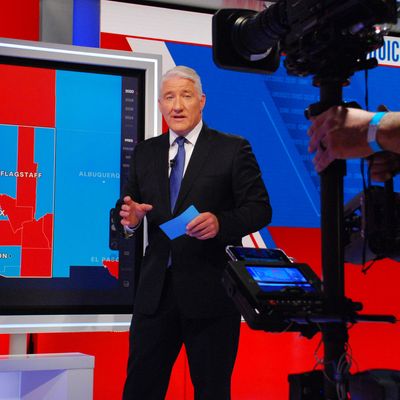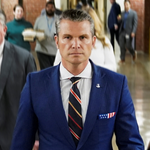
As Election Day turned into Election Week, John King kept working. CNN’s chief national correspondent pulled successive 12-to-14-hour on-air shifts, working into the early hours of the morning, perpetually flanked by his beloved “Magic Wall” of state voting data, zooming in and out of counties as the hours and days dragged on. That is, before his and other networks finally projected Joe Biden the winner nearly five days later. King has been here before: This was the ninth presidential election he’s covered — his early ones were as a political correspondent for the Associated Press before he landed at CNN in 1997.
“The adrenaline kicks in when you’re on television,” he tells me from his spare Washington, D.C., office — box of Clorox wipes, hand-sanitizer pump, one randomly placed football — when we Zoom one week postelection. “I’m not a big sleeper anyway. Normally I do about five hours a night, and this past week I’ve been averaging in the ballpark of three.” Many viewers found King’s professorial, almost robotic presence a calming one; others, creating memes and TikToks and tweets in his honor, not to mention Saturday Night Live parodying him, found King’s unwavering lack of emotion straight up athletic. As for King? He’s just happy CNN let him go home every night.
It’s Tuesday morning, Election Day. What’s John King doing?
I don’t wake up a month before the election and say, “Oh my God, the election’s coming. I have to do a cleanse or get performance-enhancing drugs or walk more.” I know it’s coming. It’s like a Super Bowl. It’s the thing I train for. It’s the thing I prepare for. I just knew it was important that morning to try and get some fresh air because I wasn’t going to be home until it was dark. So I take my coffee in the morning and just take a nice, long walk around the neighborhood. And if I can get down by the Potomac River a little bit, I do. Get some fresh air and clear the head.
Speaking of coffee, what’s the regimen looking like on Election Week?
I’m kind of worried now because some of my colleagues say they have a pint of coffee. My doctor’s probably gonna kill me, but I have a pot of coffee. I brew a big, traditional pot of coffee in the morning, and I pretty much drink the whole thing. I’ll have two cups of it at home and then I’ll pour the rest of it into my giant Yeti, and I hop in the car and I’ll drink it all. Good to the last drop. Sometimes on these long election nights, I’d also have a shot of espresso.
When headed to the office, do you at least pack a change of clothes?
I do keep an extra suit and a couple shirts in my office. Lucky for us, they keep the studios very cool, so it’s not like you’re getting hot and sweaty or anything. But I was lucky that I was able to go home between every night — or every morning; whatever that blur was — and shower and change at home. I was wearing different clothes every day, I assure you.
Let’s say you don’t make it home. Where are you crashing?
Some people have a little couch in their office; I’m actually in a temporary office right now because we’re doing renovations. So that’s why my office is very spartan. They do have a couple of relaxation rooms in the building, where you can go and get a break if you’re here for long stretches, and they have a cot or just a chair if you want to put your feet up. CNN has also been great in the past, offering hotels when we’re here for these long days. But I like to go home — it’s a 15-minute drive and I have to unwind. When I’m done, my brain is racing, so I actually enjoy the drive home.
You’re talking about getting roughly three hours of sleep per night. That’s criminal.
On that third day of three, you’re starting to feel it a little bit. No doubt about it. When you’re coming to work and you’re putting your tie on, you’re a little groggy. But I love covering elections, and this was a great story and a great drama. Doesn’t mean you’re not a little beat after, but I felt surprisingly good when I got through it.
You’ve worked in various capacities with Wolf Blitzer for more than two decades. Election coverage, though, seems to be both of your sweet spots.
One of the great gifts of Wolf is that Wolf is so steady. Wolf is just unflappable. And you’re starting to get tired, and people get a bit punchy sometimes, and Wolf is just Wolf. He’ll just look at you and nod or he’ll just crack a “How you doing? Are you sure you got that math right?” He’s just a steadying presence. So, for me, it was kind of nice being locked in a room with Wolf for a week. That sounds a little weird, right?
What are you doing during any breaks in the action?
You’re trying to do two things. One, report — send any texts or emails you can to try and get any more information. And then just try to have 20 seconds of life — text my son. Or I’m on a sports chain with a bunch of guys, so I’d just look at what they were bitching and moaning about.
Were you made aware of the countless memes, TikToks, tweets, etc. about you?
I looked at the Twitterverse, and that’s when I was like, Wow! And what struck me was the range of it: There was so much international stuff and so much from young people. That’s the part I found both interesting and noteworthy. I was laughing that there was TikTok stuff. I was like, Okay, a 59-year-old man on TikTok. Yay?
Let’s talk about your “Magic Wall.” You’ve become synonymous with it. How and when did you two first become acquainted with one another?
I found out the day of the New Hampshire primary in 2008. They rushed me to New York, and I was petrified because I had never practiced at it. At the end of it, I was in awe of the machine. That was the first time. And I guess we’ve sort of been Velcro’d to each other ever since.
Do you know how you were selected to be its shepherd?
I don’t know the answer to that. I just know that morning, they called me and said, “We decided we want you to do this. Come to New York.” And I was like, Holy shit! And I came to New York and got a few hours of practice before we went on-air. And now here I am.
You’re, dare I say, quite obsessive about the states voting data.
I’m addicted to it in some ways. I always call the United States a “50-state puzzle.” Studying them as they change is my obsession, even in nonelection years.
Do you feel any sort of rivalry with your state-election-board peer, MSNBC’s Steve Kornacki?
I don’t know him. And, honestly, I don’t have a clue what he’s doing most of the time cause I’m on live television. When I’m sitting in my office, I’ve got a TV that has the four-box thing on it, so it has Fox and MSNBC and Fox Business and CNN. So I’ll see him every now and then — preelection or postelection. Steve’s from Massachusetts, like I am, so we should know each other, I guess.
You’re quite apolitical on-air, but how has the Trump presidency impacted your job?
Listen, he’s made it harder in some ways; it’s part of how he operates. It works for him. Or at least it worked for him. Look, our business is under attack. And it is more challenging in the age of Trump because sometimes he just flat out lies. So we need to call that out: “The president just said this. That’s not true. Here’s the proof.” And then what I try to do sometimes is tell people, “Please look into this yourself. If I’m right, we’ll see you tomorrow. If I’m wrong, I lost you.”
Your election-related work continues now with Trump’s frivolous lawsuits.
We should not be surprised because he told us he was going to do this. But where’s the proof? If the bank had been robbed, the money would be gone. Listen, he won the presidency [in 2016], he succeeded in a hostile takeover of the Republican Party — he did all these things everybody said he could not do. So certain things have worked for him. And now he’s going back to the mat. But just like he couldn’t make a virus disappear, he can’t make math disappear.






























